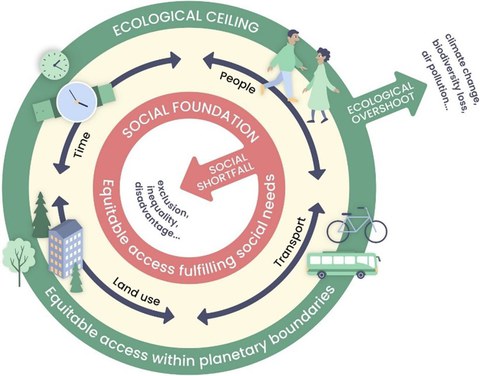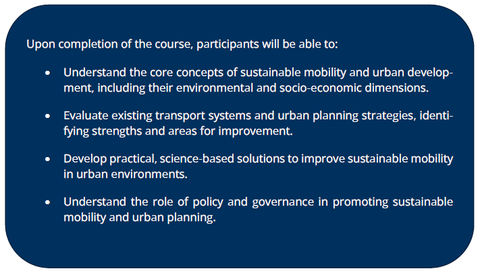92nd UNEP/UNESCO/BMUKN International Short Course - Sustainable Mobility: Transforming Urban Spaces (SC92)
Duration: August 17, 2025 – September 21, 2025 (on-site in Dresden)
Interactive full-time course with intense personal guidance and support for building lasting networks in a peer-group of international professionals.
Motivation
Rapid urbanization and growing populations in cities around the world have created significant challenges for transportation and urban planning. Traditional transportation systems that rely heavily on fossil fuels contribute to environmental degradation, air pollution, and climate change. In addition, inefficient urban planning can lead to traffic congestion, increased greenhouse gas emissions, and reduced quality of life. As cities strive to become more sustainable, the integration of holistic approaches to mobility and urban development is essential.
Sustainable mobility is at the heart of urban transformation, offering solutions to pressing environmental and socio-economic issues. By prioritizing modes that minimize carbon emissions, such as public transport, cycling and walking, cities can reduce air and noise pollution, combat climate crisis and have a positive impact on the health of their residents. In addition, sustainable mobility strategies can ensure equitable access, promoting social inclusion and improving the overall quality of life. At the same time, urban planning plays a central role in shaping the physical and social fabric of sustainable and livable cities. By promoting compact, mixed-use development patterns and optimizing infrastructure investments, cities can create more efficient, livable environments while preserving valuable natural resources. Such well-designed urban areas not only increase resilience to climate change but also stimulate economic growth and innovation.

Figure 1: Conceptual model for accessibility within the safe and just space. Adapted from Raworth (Citation2012). Credit: Transport Reviews (2023). DOI: 10.1080/01441647.2023.2240958
Achieving sustainable mobility and urban development goals will require concerted efforts and cooperation at all levels of society. Governments, businesses, communities, and individuals must work together to develop and implement forward-thinking policies, invest in resilient infrastructure, and drive behavioral changes. Leveraging the collective strength of these collaborations, cities can dismantle existing barriers and accelerate progress toward a sustainable, inclusive future for all.
Course concept and objectives
This course offers an in-depth exploration of sustainable mobility and its role in urban development, based on scientific research and practice. Participants will explore the principles of sustainable transport systems, resilient urban planning and policy-making. The curriculum covers a range of topics including the environmental and socio-economic impacts of transport, the design and implementation of sustainable mobility solutions, and the integration of sustainable urban development. Through a combination of lectures and case studies, interactive group work and project-based learning, participants will acquire the skills and knowledge necessary to contribute to sustainable urban development. The short course will explore critical topics such as:
- Introduction to sustainable mobility and urban development.
- Sustainable mobility and urban development in the context of the SDGs.
- New Urban Agenda and its Implications for sustainable and resilient cities.
- Urban planning and design for sustainability.
- Environmental impacts and mitigation strategies.
- Social equity and inclusive mobility.
- Planetary boundaries and doughnut economics.
- Theory of change and systemic transformation.
- Policy and governance frameworks for sustainable mobility and urban planning.
With the course-accompanying creation of individual Post-Training Action Plans (PTAPs), participants prepare themselves to transfer knowledge acquired in the training into their professional action spaces.
Target groups
This course is aimed at qualified professionals who prepare and implement political decisions and practical measures towards the goals of urban sustainable development and mobility in ministries, authorities, local government and non-governmental institutions of developing countries (including emerging economies).
We expect a high motivation to explore concepts for urban sustainability and mobility and to work towards implementing them. A first university degree (e.g. BA, BSc) in a related field is essential. Adequate communication skills in the English language and the nomination by the delegating institution for this full-time course are mandatory.
What makes participating in this course impactful?
- Experience of the CIPSEM team in conducting engaging, meaningful trainings considering the challenges in developing countries and emerging economies.
- A full-time, 4-weeks learning experience combining classroom sessions, excursions, and group work with guided self-study units.
- Renowned international and German facilitators.
- Boost of motivation through experience sharing and bonding with fellow experts.
- Participants become part of a large international network of environmental experts and leaders (more than 2 800 alumni from 146 countries).
- Transfer of the gained knowledge and skills though mentored development of post-training action plans.
- Alumni of this course can apply for one of several transfer-to-action fellowships supporting the implementation of the post-training action plan with €2000.
Fellowship opportunities
The program can award 16 fully funded fellowships covering accommodation in comfortable single studio apartments, local public transport, and all tuition fees (including excursions). Also included are round-trip flights from the participant's country of origin to Dresden, insurance, and a contribution of €550 toward living expenses.
Five additional, partial, fellowships can be awarded among those applicants, who are able to contribute transportation to and from Dresden, insurance, and living expenses other than housing. The partial fellowships include housing in comfortable single studio apartments, public transportation, and all tuition (including excursions).
For these partial fellowships, also applicants who currently reside in a non-DAC country are eligible, if their origin and (prospective) area of professional engagement is in a DAC country.
Application & participation
Qualified professionals are welcome to apply for this training from 11 February until 18 March 2025 on CIPSEM’s online application portal. The Steering Committee selects 21 (16+5) participants for this course by May 2025. Selected participants will be informed via email. Successful participants are awarded a Certificate of Proficiency in Sustainable Mobility: Transforming Urban Spaces.
Please note that the duration stated at the beginning corresponds to the financing period. This includes the course period from August 21, 2025 – September 17, 2025, as well as four arrival days before the start of the course and four departure days after the end of the course.
You can access the online application portal via the following link: https://crm.bu.tu-dresden.de/ausschreibung?call=CIPSEM2025-SC92
Before applying, please also take a look at our hints on application, explanations regarding the application portal and answers to frequently asked questions. For information on other courses, please visit https://tud.de/cipsem/upcoming.
► If you have an important question that is not addressed on our website or in the help texts within the application form, please contact us at . Before reaching out, we ask you to check the resources provided thoroughly.
Supported by


